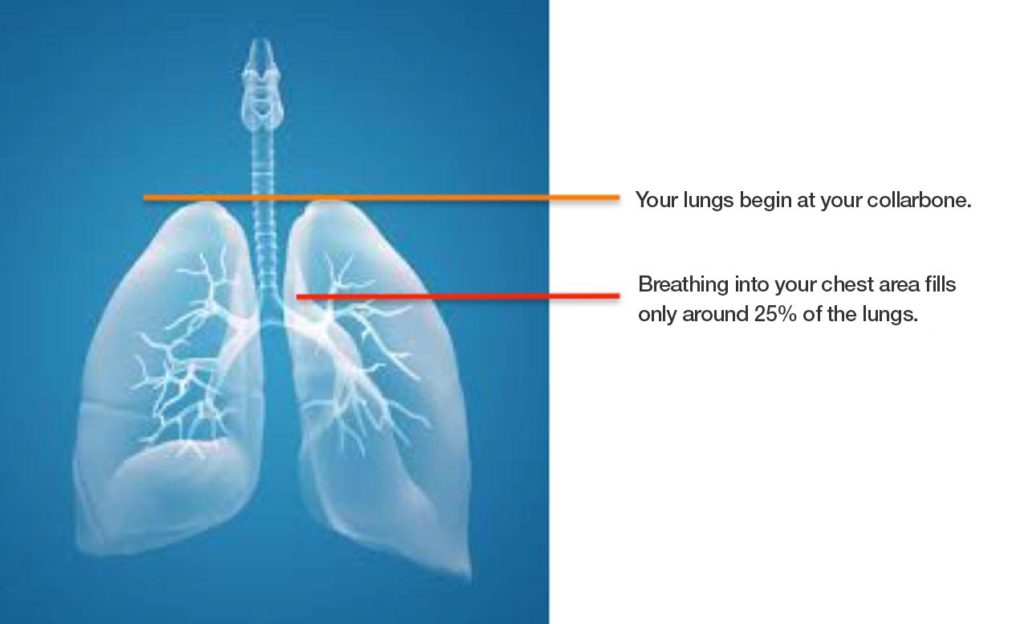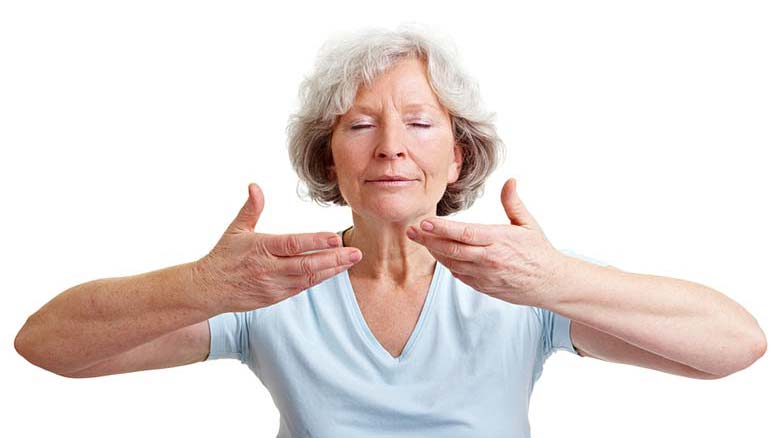How often do you think about breathing? Have you ever put your awareness on your breath? Where does it go? What does it feel like? Is it easy or hard to breath?
If you’re thinking, “Why do I need to think about breathing? That’s the one thing I don’t have to worry about.” I invite you to read on because there is so much more to the breath than you may realize.
Just like a house needs a foundation to be built on, breath (and water) are the foundations of the body. The quality of that foundation will determine the quality of the structure of the house, or the body. So it is important to clarify that the breath does more than fill the lungs and keep you alive. Learning to breathe more deeply can have a significant positive impact on your health and well-being.
Turn your awareness to your breath
Right now, let’s turn your awareness to your breath. You don’t need to change anything, just watch what is happening in your body. Where is the breath going? Does your chest rise immediately after breathing? Can you feel the air expanding your waistline? How does it ‘feel?’ The odds are, that you are only breathing into the upper part of your chest.

As you can see in Figure 1, the upper part of your chest is only about 25% of your lungs! How does this affect your body?
If the foundation is breathing, then breathing only into the upper part of the chest is of poor quality because it does not fill up all of the lungs. Therefore, the structure/body will not function at a high quality either.
How old are you? Well, that is the number of years your body has been receiving this poor quality breath. And after years of breathing like this, the structure/body is obviously affected. And it is the #1 cause of stress and anxiety in our society.
How does the body use oxygen?
Now, let’s clarify how the body uses oxygen. Oxygen goes into the lungs via breathing which is then transported by red blood cells through the blood to all the organs and systems in your body. Water is key here as well—which will be discussed in the next blog.
For simplicity sake, every living thing that makes up your body needs oxygen to survive. When the body is not receiving enough oxygen, it will disperse it to the most important areas first; therefore, leaving other parts of your body practically suffocating. And the whole structure/body suffers.
Forgetting to focus on breath
The key thing to understand here is that your body is constantly talking to you. But how often do you listen? When do you give your body the time it needs?
You may be saying, “There isn’t any time because I have to run here and do that and pick up so and so and….” Wow, just writing that sentence created tension in my body and I stopped breathing.
It’s okay. No one is blaming you. So please don’t beat yourself up. It simply isn’t your fault. These things are not taught in our society. Instead, we are taught to live in anxiety, to live worrying about the next step.
Have you ever met a 50-year-old who looked 30? Or a 75-year-old who looked 50? And then wondered how that came to be? Why do yogis and monks look so young and happy? If you have traveled to different countries then you have probably seen more of this. One of the key ingredients is deep, conscious breathing. This quality breathing is shown through the skin and eyes of those around us. It brings us back to the present moment and alleviates the stress and tension we carry in our bodies.
Can I retrain myself to breathe?
So, I am sure you are wondering. Can my mind be re-trained to breathe properly? The answer is YES! At NO charge to you, in the comfort of your own home. With new, daily routines you can retrain yourself to breathe deeply.
One key thing to mention here, is to not beat yourself up while you are learning. You are undoing years of practicing it the wrong way. Just focus on being aware of the breath, and everything else will fall into place.
Health benefits to breathing DEEP
- SKIN: Toxic CO2 waste is eliminated directly through your breath, and your skin (the largest organ your body has) benefits with improved blood flow and oxygenation.
- Endocrine System: The action of your diaphragm helps push the lymph throughout the body, which helps to eliminate toxic waste and strengthen the immune system.
- Detoxifies and Releases Toxins: The body is designed to release 70% of its toxins through breath.
- Breathing Releases Tension: When you are tense, angry, scared, stressed, frustrated, etc. then your muscles get tight and your breathing becomes shallow.
- Clarity and Healthy Brain Function
- Clearing Emotional Baggage
- Relieves Pain: When you anticipate pain it is likely that you hold your breath. Studies show that breathing reduces pain.
- Breathing Massages Your Organs: Wow! You can get an internal massage for FREE!
- Build Muscle
- Strengthen/Build Immune System
- Improve Posture
- Improve Quality of Blood
- Increase Digestion
- Improves Nervous System
- Strengthens Lungs
- Makes Heart Stronger
- Weight Control
- Boost Energy and Improves Stamina
- Improves Cellular Regeneration
Simple breathing exercise for all ages

- Either sitting or lying down, place one hand over your chest and the other over the belly.
- Exhale everything out, feeling your belly sink into the floor.
- Inhale, on the count of 4, feeling your belly rise FIRST then your chest rise last. (If you can do this for more than 4 seconds, great!)
- Slowly exhale, to the count of 6, from your chest first, ending with your belly completely flat.
- Repeat 2-4 times, at a minimum of 10 sets each day.
Helpful TIPS
- Practice breathing in the morning before getting out of bed.
- Practice breathing after meals.
- Practice breathing in the evening before going to bed.
SIMPLE TIP—just pay attention to your breath. With attention you will begin to breath deeper more often and you will begin to notice when you stop/tense up.
There are tons of FREE videos on YouTube and articles throughout the web to learn more about breathing. Enjoy living a more peaceful life through BREATHING!
Resources
Max Strom, TEDx Talk: Breathe to Heal
Mercola Article on Breathing by Dr. Andrew Weil
http://articles.mercola.com/sites/articles/archive/2009/07/07/The-Most-Powerful-Health-Recommendation-of-Dr-Andrew-Weil.aspx
Dr. Andrew Weil’s Benefits of Breath Demonstration
http://www.drweil.com/drw/u/VDR00112/The-4-7-8-Breath-Benefits-and-Demonstration.html
One Powerful Word Article
http://www.onepowerfulword.com/2010/10/18-benefits-of-deep-breathing-and-how.html
